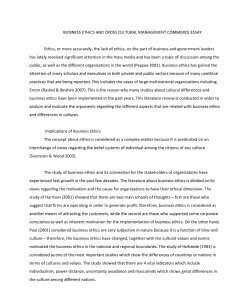BUSINESS ETHICS AND CROSS CULTURAL MANAGEMENT COMMERCE ESSAY Ethics, or more accurately, the lack of ethics, on the part of business and government leaders has lately received significant attention in
BUSINESS ETHICS AND CROSS CULTURAL MANAGEMENT COMMERCE ESSAY Ethics, or more accurately, the lack of ethics, on the part of business and government leaders has lately received significant attention in
BUSINESS ETHICS AND CROSS CULTURAL MANAGEMENT COMMERCE ESSAY
Ethics, or more accurately, the lack of ethics, on the part of business and government leaders has lately received significant attention in the mass media and has been a topic of discussion among the public, as well as the different organizations in the world (Peppas 2002). Business ethics has gained the attention of many scholars and executives in both private and public sectors because of many unethical practices that are being reported. This includes the cases of large multinational organizations including Enron (Rashid & Ibrahim 2007). This is the reason why many studies about cultural differences and business ethics have been implemented in the past years. This literature review is conducted in order to analyze and evaluate the arguments regarding the different aspects that are related with business ethics and differences in cultures.
Implications of Business Ethics
The concept about ethics is considered as a complex matter because it is predicated on an interchange of views regarding the belief systems of individual among the citizens of any culture (Svensson & Wood 2003).
The study of business ethics and its connection for the stakeholders of organizations have experienced fast growth in the past few decades. The literature about business ethics is divided on its views regarding the motivation and the cause for organizations to have their ethical dimension. The study of Harrison (2001) showed that there are two main schools of thoughts – first are those who suggest that firms are operating in order to generate profit, therefore, business ethics is considered as another means of attracting the customers, while the second are those who supported some corporate conscience as well as inherent motivation for the implementation of business ethics. On the other hand, Paul (2001) considered business ethics are very subjective in nature because it is a function of

